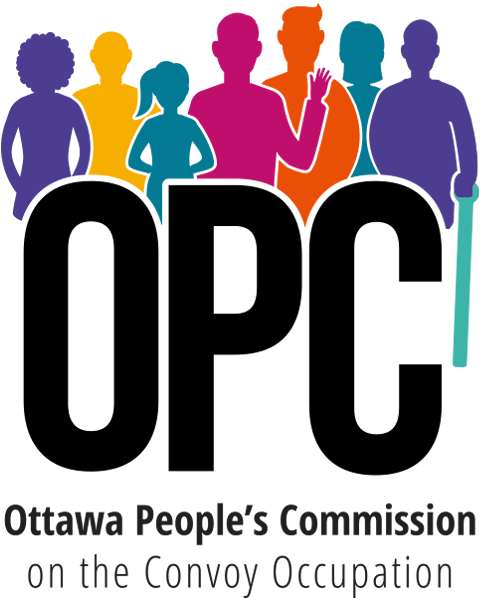

OTTAWA (Monday, Jan. 30 2023) – The Ottawa People’s Commission on the Convoy Occupation (OPC) has released Part I of its final report, entitled What We Heard, which focuses on the impacts of the 2022 convoy occupation on local residents.
OPC is an initiative of the Centretown Community Health Centre.
Despite claims from many convoy supporters, including some Canadian political leaders, that the events of January and February 2022 were nothing more than a peaceful protest, the OPC commissioners heard abundant testimony making clear the convoy blockade was, in fact, an occupation of downtown Ottawa with violence at its heart.
For three-and-a-half weeks, Canada’s capital was held hostage by a group with diverse interests — including some known to be members of the far right — who trumpeted their intent to shut down Ottawa. Local residents and businesses were then abandoned by authorities and left unprotected against unruly, sometimes violent occupiers who perpetrated a range of human rights abuses.
It was an occupation. Three weeks of gridlocked streets, weaponized truck horns, and toxic fumes set this event apart from other protests that are commonplace in Ottawa. Threats to residents and businesses in the red zone were ignored by police and bylaw officers as protesters installed themselves throughout residential Centretown. The convoy was also allowed to set up a base camp along Coventry Road, which endangered Vanier and Overbrook residents, who pleaded for authorities to enforce the law. Despite making clear their goals to gridlock the city before their cross-country journey, the convoy was met with no resistance from authorities.
It was unquestionably violent. Blockading residences and businesses with big rigs, blaring horns incessantly at harmful decibel levels, convoy participants created a climate of hostility and aggression wherever they went in Ottawa. Many residents reported being accosted and even assaulted by convoy participants for wearing masks. Some were intimidated, threatened and insulted with racist, misogynist, Islamophobic, homophobic, transphobic and other taunts, as well as with displays of antisemitic and racist flags, banners and posters. This conduct constitutes violence.
People were completely abandoned. Police virtually stopped enforcing the law in the red zone, appearing to do everything to avoid escalation. They instead provided space for the convoy to occupy the city. Many residents told OPC they were openly harassed or assaulted by convoy participants in front of police officers who did nothing. Some people were even dissuaded by officers from filing incident reports. Others called emergency lines concerned about fire hazards posed by gas containers near idling vehicles, fireworks being set off amidst residences, and complaints of constant honking. They were invariably told there was nothing to be done. Officers told residents they were under orders to observe only, which is in sharp contrast to the swift and often aggressive enforcement action that marks police responses to other disruptive, yet peaceful, protests. Residents also highlighted the lack of clear communication from police and the City of Ottawa surrounding safety concerns, blockades, transit disruptions, etc.
The community mobilized when the police and governments failed. Residents came together to support each other when emergency and city services abandoned them. A group of residents in one building started food sharing when they felt they could not leave their homes, others would get essential supplies for people dependent on Para Transpo, which was suspended for the entirety of the occupation. Community organizers prepared and delivered food to folks in need and shared vital information with each other via social media networks when authorities were of no help. This all reached a culminating point during the ‘Battle of Billings Bridge’ when residents, frustrated by the lack of action from authorities, took it upon themselves to block a group of trucks from entering the city’s downtown on Feb. 13, 2022.
The Commission also heard from some Ottawa-Gatineau residents who supported and welcomed the convoy. Many cited two years of feeling ostracized due to their COVID-19 vaccine status, masking rules and other public health protocols. They felt liberated by the convoy’s arrival. While most testimonies OPC heard recounted harm and abuse, these contrasting views and experiences are reflected in the report.
OPC has found that the official response during the Winter 2022 convoy occupation of central Ottawa was a human rights failure by all three orders of government and police. The Commissioners conclude: “the experience of the convoy occupation is an indictment of the failure of governments to take human rights seriously in how they formulate laws and policies, how they set budgets, and how they reach decisions and take action.”
Governments have an obligation to uphold human rights and to take all reasonable steps to protect people from human rights abuses. In this instance, they did not fulfill their obligation, leading to harmful consequences and ongoing trauma for residents and business owners — particularly for the most vulnerable members of the community.
Part II of OPC’S report will consider these human rights failings in greater depth and propose recommendations for reform. The full version of Part I – What We Heard — is available at opc-cpo.ca.
Quotes from Commissioners
Leilani Farha: “The gravity of what happened in Ottawa when the convoy arrived, and stayed, is found in one word: occupation. Many residents didn’t experience this like a regular protest; they felt their city had been invaded and was under siege.”
Monia Mazigh: “Often, we heard by some media and politicians that the Ottawa convoy was a ‘peaceful’ protest. On the ground and from a majority of residents affected by the convoy, the description was the opposite. Many of the residents experienced physical, verbal, and mental violence. The violence they went through was unbearable.”
Alex Neve: “The challenges for police and government of responding to the convoy occupation may have been considerable, but that should not have come at the cost of abandoning the community that was living through its harmful and violent impact. Human rights can never be abandoned.”
Debbie Owusu-Akyeeah: “In the absence of much-needed leadership from decision-makers, residents mobilized to create new networks of care: getting essentials for the vulnerable, organizing safe walks, and sharing vital information on how to navigate the new challenges faced while living in and around downtown. Most importantly, people mobilized collectively to reclaim power many had lost as a result of the ongoing occupation.”
For more information, visit opc-cpo.ca or please contact:
